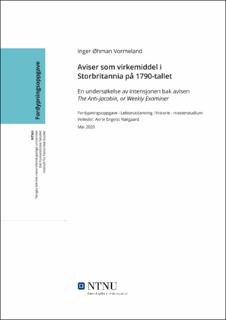| dc.contributor.advisor | Nørgaard, Anne Engelst | |
| dc.contributor.author | Vormeland, Inger Øhman | |
| dc.date.accessioned | 2021-09-13T16:01:17Z | |
| dc.date.available | 2021-09-13T16:01:17Z | |
| dc.date.issued | 2020 | |
| dc.identifier | no.ntnu:inspera:57494038:18380246 | |
| dc.identifier.uri | https://hdl.handle.net/11250/2775491 | |
| dc.description.abstract | I denne oppgaven har bruken av aviser for å fremme egen agenda blitt undersøkt, med spesifikt fokus på Storbritannia i perioden rundt den franske revolusjonen. Problemstillingen lyder som følger; «Hva var intensjonen med publiseringen av avisen The Anti-Jacobin, or Weekly Examiner og hvordan uttrykker dette seg i avisens tekster?» Utgangspunktet for oppgaven er altså en tekstanalyse av avisen The Anti-Jacobin, or Weekly Examiner, med spesielt fokus på intensjonen bak avisen. Det har dermed blitt valgt ut Quentin Skinners teori om intensjonen bak en tekst som et teoretisk bakteppe for oppgaven.
Oppgavens hovedkilde har altså vært avisen The Anti-Jacobin, or Weekly Examiner. Avisen ble gitt ut i 36 utgaver, mellom 20. november 1797 og 9. juli 1798. Avisen har blitt undersøkt ved tekstanalyse hvor relevante artikler har blitt nærmere gjennomgått i oppgaven. Fokuset ble lagt til fire forskjellige artikler, som alle forteller noe om intensjonen bak avisen. Undersøkelsen viste at avisen hadde både uttalte og skjulte motiver. De uttalte motivene var derimot virkemidler for å fremme de skjulte. Disse gikk ut på å undersøke pressens dekning av sannheten ved å avsløre det redaksjonen definerte som løgner, feilaktige fremstillinger og misoppfatninger. Disse motivene var derimot med på å bygge opp om avisen egentlige mål, nemlig å undergrave opposisjonen, øke tiltroen til myndighetene og styrke krigsmoralen i landet. Disse motivene kom til uttrykk i teksten gjennom propagandavirkemidler, skildringer av politiske motstandere som jakobinere og forklaringer av krigen som nødvendig for Storbritannias overlevelse. | |
| dc.description.abstract | This study has examined newspapers role in promoting their editorials views and agenda, specifically with regards to Great Britain during the French Revolution. The research question which this study has examined is, “What was the intention behind the newspaper The Anti-Jacobin, or Weekly Examiner and how is this reflected in the papers writings?” The base of this study is therefore a textual analysis of The Anti-Jacobin, or Weekly Examiner, where the focus is targeted at the intentions behind the newspaper. Consequently, has Quentin Skinners theory on intentions behind text been selected as the theoretical backdrop for the analysis.
The Anti-Jacobin, or Weekly Examiner is hence the main source of this study. The Newspaper was published between the 20. November 1797 and the 9. July 1798, in 36 issues. Through a textual analysis has the paper been examined for relevant articles that can allude to the intentions for the paper’s publication. Four articles war selected to be examined closer. The study found that The Anti-Jacobin, or Weekly Examiner had both spoken and hidden motivations. The spoken goals however worked as an instrument to promote the hidden motives. This spoken goals was to examine the querent press’s coverage of the truth by revealing what the editorial defined as lies, misrepresentations and mistakes. This promoted the papers actual motivations, which were to undermine the opposition, to strengthen the trust in the authorities and to strengthen the belief in the war against France. These motives are reflected in the texts through propaganda, descriptions of political adversaries as Jacobins and illustrations of the war against France as necessary for Britain’s survival. | |
| dc.language | | |
| dc.publisher | NTNU | |
| dc.title | Aviser som virkemiddel i Storbritannia på 1790-tallet | |
| dc.type | Bachelor thesis | |
